Demise of Ḥaḍrat ʿAllāmah Dr Khalid Mahmood Ṣāḥib (1344/1925 – 1441/2020)
بسم الله الرحمن الرحیم
It is with great sadness and sorrow we received the news of the demise of 97-year-old, Ḥaḍrat ʿAllāmah Dr Khalid Mahmood Ṣāḥib Raḥimahullāh yesterday morning on 20/21 Ramadan 1441 (14 May 2020) in Manchester, UK. This is undoubtedly a great loss for the Ummah.
ʿAllāmah Ṣāḥib served the Dīn with great rigour and passion for some seven decades and was renowned for his knowledge of the deviant and misguided groups and defence of the Islamic creed and the Ṣaḥābah (the companions). His writings and books on a range of topics illustrate the depth and breadth of his knowledge and comprehension. He travelled the world, participated in various conferences, debates and court cases and was a formidable debater against the Qadiyanis, Shiites and other sects. In 1987, he spent a month in South Africa and made representations to the court on the Qadiyani case. This is one of many examples. He was also known for his knowledge on comparative religions and the other Islamic sciences, and was regarded in high esteem by his teachers, contemporaries and students.
Mawlānā ʿAṭāullāh Shāh Bukhārī (d. 1381/1961) said:
“If a fitnah was to emerge at ʿAṣr Ṣalāh time, and ʿAllāmah Ṣāḥib is informed of it and its evidences, he can eliminate it with evidence before sunset.”
ʿAllāmah Ṣāḥib enjoyed a very good relationship with Ḥakīm al-Islām Qārī Muḥammad Ṭayyib (d. 1403/1983) and many other scholars of that generation, and in this regard his place is among the luminaries of the previous century.
Early life, education and teachers
ʿAllāmah Ṣāḥib was born in Kasur, a city to the south of Lahore, where his father Pīr Muḥammad Ganī was a government employee, renowned for his piety. His family originated from Amritsar and his father had moved here for employment. Thus, his early education was acquired in Kasur, and thereafter in Amritsar.
ʿAllāmah Ṣāḥib excelled in both the Islamic and worldly sciences. He travelled to Deoband to complete his studies. He studied under great luminaries such as Mawlānā Iʿzāz ʿAlī (d. 1374/1954), ʿAllāmah Ibrāhīm Balyāwī (d. 1387/1967), Mufti Muḥammad Shafīʿ ʿUthmānī (d. 1396/1976) and Shaykh al-Islām Mawlānā Ḥusayn Aḥmad Madanī (d. 1377/1957). He began the final year and started the study of Ṣaḥīḥ al-Bukhārī with Shaykh al-Islām Mawlānā Ḥusayn Aḥmad Madanī. However, this was the time of great political turmoil and Shaykh al-Islām was unable to continue to teach.
Therefore, around the mid-1940s, ʿAllāmah Ṣāḥib travelled to Dabhel (Gujarat) and completed his studies under great luminaries such as ʿAllāmah Shabbīr Aḥmad ʿUthmānī (d. 1369/1949), Mawlānā Badr ʿĀlam Mīrtī (d. 1385/1965) and Shaykh Muḥammad Yūsuf Binorī (d. 1397/1977). After graduating from here, he also participated in some lessons at Jamia Ashrafia Lahore, which was established by Mufti Muḥammad Ḥasan (d. 1380/1961) in 1947. Mufti Muḥammad Ḥasan had taught him in Amritsar prior to his travel to Deoband. It was here that he benefited from Mawlānā Idrīs Kāndhelwī (d. 1394/1974).
After ʿAllāmah Ṣāḥib successfully completed acquiring the Islamic sciences, he read Law and attained the LLB, and also a Masters in Persian, Arabic and Islamic studies. He was also appointed as a lecturer at a college in Sialkot.
Throughout his life, ʿAllāmah Ṣāḥib benefited from the company and direction of many senior luminaries of the subcontinent. He also acquired ijāzah in ḥadīth from Shaykh al-Ḥadīth Mawlānā Muḥammad Zakariyyā Kāndhelwī (d. 1402/1982) and spent time in his company. Initially, his spiritual connection was with Mawlānā Aḥmad ʿAlī Lāhorī (d. 1381/1962) and thereafter with Shāh Mawlānā Waṣiyullāh (d. 1383/1964) and thereafter with Mawlānā Abrār al-Ḥaq (d. 1426/2005). In Taṣawwuf, he had ijāzah from Mawlānā Qamruzzamān Ilāhābādī (b. 1351-2/1933).
The two teachers that influenced him the most
Mawlānā Iqbāl Rangūnī Ṣāḥib (b. 1378/1958), an accomplished author who perhaps benefited the most from ʿAllāmah Ṣāḥib, mentions that from among all his teachers, ʿAllāmah Ṣāḥib would regularly mention ʿAllāmah Shabbīr Aḥmad ʿUthmānī and Mawlānā Idrīs Kāndhelwī and advise everyone to read their works. He would strongly recommend anyone delivering lessons on the Quran to use Tafsīr ʿUthmānī and regarded ʿAllāmah Shabbīr Aḥmad ʿUthmānī as the guardian of the knowledge of Mawlānā Qāsim Nānowtwī (d. 1297/1880). Mawlānā Iqbāl Rangūnī adds that ʿAllāmah Ṣāḥib was undoubtedly the guardian of the knowledge of both Mawlānā Qāsim Nānowtwī and ʿAllāmah Shabbīr Aḥmad ʿUthmānī.
The fulfilment of Mawlānā Qāsim Nānowtwī’s aspiration
The current rector of Darul Uloom Deoband (Waqf), Mawlānā Muḥammad Sufyān Qāsmī (b. 1374/1954) narrates an interesting incident. He is the grandson of Ḥakīm al-Islām Qārī Muḥammad Ṭayyib, who is the grandson of Mawlānā Qāsim Nānowtwī. He mentions that in 2019, he visited ʿAllāmah Ṣāḥib in Manchester, and ʿAllāmah Ṣāḥib said to him:
“Today, you have not come on your own accord, Allah Almighty has sent you to me due to a supplication of mine.”
He took out a draft of a publication which was ready to be sent to the printers. He explained that he had attempted in this book to shed light on the knowledge of Mawlānā Qāsim Nānowtwī. There was a delay in sending the book to the printers because of which he had expressed his disappointment to Mufti Fayḍurraḥmān Ṣāḥib. However, at the same time he wished that Allah Almighty would send someone from the family of Mawlānā Qāsim Nānowtwī so that they could physically hand the book over. With this, ʿAllāmah Ṣāḥib handed the book to Mawlānā Muḥammad Sufyān and requested him to formally hand it over to Mufti Fayḍurraḥmān to send to the printers. This, ʿAllāmāh Ṣāḥib explained, was the reason why Allah Almighty has brought you here today.
Mawlānā Muḥammad Sufyān further mentions that ʿAllāmah Ṣāḥib then mentioned an incident wherein Mawlānā Qāsim Nānowtwī was travelling for Hajj with a group of scholars and on route they met a European scholar. They were unable to converse directly due to the language barrier. Eventually, an interpreter came and they discussed world security and philosophy. Following this, Mawlānā Qāsim Nānowtwī said something to this effect:
“If I live, it is my ardent desire to learn English on return to India so I can visit Europe and convey to their intellectuals the reality of Islam and the true philosophy.”
Mawlānā Qāsim Nānowtwī was unable to fulfil this aspiration. However, ʿAllāmah Ṣāḥib said:
“His supplication was accepted, and Allah Almighty chose me for this purpose and sent me to Europe to fulfil this aspiration.”
Migration to the UK
ʿAllāmah Ṣāḥib travelled to the UK in 1966 and established the Islamic Academy of Manchester. ʿAllāmah Ṣāḥib was from among the first group of scholars in the UK from the sub-continent who played a pivotal role in the early development of British Muslims. He also served as the Chair of Jamiat Ulema UK.
During his early years in the UK, he acquired a doctorate from the University of Birmingham. On one occasion I asked him for advice on a potential PhD subject and I asked him about his subject, he informed that his PhD subject was a comparative study on Bukhārī and Kulaynī’s views on the Quran.
Service to Dīn until the very end
Some two decades ago, ʿAllāmah Ṣāḥib was also appointed as a justice of the Supreme Court of Pakistan (Shariat Appellate Bench). He also sat on the boards of various institutes. However, his life long struggle centred on defending the companions (Ṣaḥābah) and the Islamic creed and his knowledge and insight into this was second to none. Until the very end of his life, he continued to participate in the finality of prophethood conferences, and on this subject, he wrote many works.
Despite his elderly age, his memory and intellectual acumen were not affected in the least, as reflected in his recollection of events and reading out long Arabic texts from memory.
Many of the leading scholars of Pakistan benefited from him throughout his life. In 2011, he began to teach Muwaṭtaʾ Mālik at Jamia Ashrafia, Lahore and continued doing so until his demise. He would spend a few months in Pakistan and the remainder in the UK. Mawlānā Iqbāl Rangūnī mentioned to me today that his lessons on Muwaṭṭaʾ will be published soon and that it will demonstrate his profound understanding and insight. In May 2018, Sufi Sarwar passed away and he was also given the responsibility of teaching Ṣaḥīḥ al-Bukhārī at Jamia Ashrafia.
Publications
ʿAllāmah Ṣāḥib authored over 50 books, most of them in the Urdu language. These books are substantive and thereby serve us a very useful reference point on range of topics. Unlike many Urdu books, ʿAllāmah Ṣāḥib’s books are critical and fully referenced. They are encyclopaedia in their own regard. They add value and do not merely regurgitate.
Some of the famous titles include: Āthār al-Tanzīl, Āthār al-Ḥadīth, Āthār al-Tashrīʿ and Āthār al-Iḥsān, these four books are an excellent introduction to the sciences of Tafsīr, Ḥadīth, Fiqh and Taṣawwuf respectively, in two volumes each. Other famous titles include: ʿAbaqāt (two vols), Khulafāʾ Rāshidīn (two vols), Muṭālaʿah Barelwiyyat (9 vols), Madārik al-Adhkiyāʾ fī Ḥayāt al-Anbiyāʾ (1 vol), ʿAqīdah Khayr al-Umam fī Maqāmat ʿIsā ibn Maryam ʿAlayhi al-Salām (1 vol) and Ḥujjiyat Ḥadīth in English. These and the many other works of ʿAllāmah Ṣāḥib will serve as a Ṣadaqah Jāriyah for him. Many of these books are available online and Urdu readers are strongly recommended to read them.
Some personal memories
When I graduated from Darul Uloom Bury in 2005, my respected father Mufti Shabbir Ahmad (b. 1376/1957) advised me to visit ʿAllāmah Ṣāḥib and benefit from him, as he is an ocean of knowledge, who is undervalued. I also recall my father mentioning on numerous occasions that ʿAllāmah Ṣāḥib’s books are comprehensive, with a lot of depth, which are worth reading, and that he is truly deserving of the title: ʿAllāmah. However, at the time, due to commitments, I was unable to benefit from him, which I regret.
However, in 2017, I visited him with my respected father and other scholars including Mawlānā Iqbāl Rangūnī. During this visit, my dear friend Mawlānā Ḥanīf Ṣāḥib, the Imam of Masjid Hidayah, Manchester, mentioned to ʿAllāmah Ṣāḥib about a book that I had authored ʿAllāmah Ṣāḥib was extremely pleased, this was the beginning of the personal relationship with him.
Since this visit in 2017, I had the unique privilege and honour to benefit from ʿAllāmah Ṣāḥib’s ocean of knowledge on a 1-1 basis several times. I must thank my dear friend Mawlānā Zubair ibn Mufti Nazir for arranging some of these visits. Al-Ḥamdulillāh, I wrote the records of most of these meetings in Urdu. On reflection, they contain treasures, featuring discourses, discussions, Q&As and much more. ʿAllāmah Ṣāḥib would sometimes also share with me some of his thoughts in confidence. I was always in awe of his profound memory until the very end, he would read long texts to me from a variety of books. Inshāʾ Allah, if Allah Almighty grants tawfīq, these Urdu records will be typed for the benefit of readers.
Throughout all the encounters, the most profound memory of mine is the way in which he treated me on one occasion, which shows his ardent love for our beloved Prophet ﷺ and the Ḥaramayn. On 31 July 2019, I visited him with my cousins Mawlānā Ashraf and Mawlānā Sulaymān after Maghrib Ṣalāh. We entered his room in the cabin outside the City Jami’ Masjid, and the discussion started on a range of subjects. ʿAllāmah Ṣāḥib would very meticulously recall our previous discussions, and any writings I may have shared with him, despite weeks and often months having passed. I informed him about my visit to Hajj, and he gave some pertinent advice. The discussion continued until ʿIshaʾ Ṣalāh.
After ʿIshaʾ Ṣalāh at 10.30pm, ʿAllāmah Ṣāḥib requested everyone to remain seated after the Sunnah and Witr prayers. Then, he began:
“This person [referring to me] is travelling for Hajj, his father is Mufti Shabbir, who is my good friend and admirer, and I also admire him, his father is already in Hajj and he is travelling there after two days. Therefore, everyone remain seated, request him to make Duʿāʾ for you and also request him to convey salutations to the best of mankind ﷺ.”
He then said in a very emotional tone:
“Please convey Salām to the Prophet ﷺ, from everyone who is present at City Jami’ Masjid, Manchester after ʿIshaʾ Ṣalāh today.” (I duly complied and informed him via his grandson once I did so).
I was struck at the humility of ʿAllāmah Ṣāḥib. The love for the Prophet ﷺ, that was conveyed in those few moments, in the tone and the words, in the collective Duʿāʾ thereafter to make my journey easy, is beyond description. After the Duʿāʾ, I was left speechless when he requested everyone to shake hands with me. I had never experienced anything like this and did not expect a man of such stature, the teacher of teachers, to attach so much importance and show so much respect to a young student travelling to Ḥaramayn. This was a sign of genuineness and sincerity at this age, and conveyed the inner feelings, humility and respect ʿAllāmah Ṣāḥib possessed. Such important aspects are often overlooked.
The final time I met ʿAllāmah Ṣāḥib was on 5 November 2019. Prior to this, his grandson who I had met in Malta a few weeks earlier, contacted me to say ʿAllāmah Ṣāḥib was remembering me. I was unable to visit him after Hajj due to travelling abroad to Greece and Hungary. When I arrived, ʿAllāmah Ṣāḥib was alone. He was visibly sad and did not say much. He said:
“After you went for Hajj, I went through some very difficult and testing times.”
When ʿAllāmah Ṣāḥib stood up to go for Ṣalāh, he hugged me, which he would not normally do. Little did I know that this was our final meeting.
Final moments and demise
Just over a week ago, ʿAllāmah Ṣāḥib fell down and fractured his hip bone. He was admitted to hospital and following his operation, his condition became critical. He passed away yesterday morning, leaving behind a great legacy. Mawlānā Iqbāl Rangūnī confirmed that at some stage he developed Covid-19 and thereby he passed away a martyr. ʿAllāmah Ṣāḥib was 97 years old when he passed away. A ḥadīth states:
ما من معمر يعمر في الإسلام أربعين سنة، إلا صرف الله عنه ثلاثة أنواع من البلاء: الجنون، والجذام، والبرص، فإذا بلغ خمسين سنة، لين الله عليه الحساب، فإذا بلغ ستين، رزقه الله الإنابة إليه بما يحب، فإذا بلغ سبعين سنة، أحبه الله، وأحبه أهل السماء، فإذا بلغ الثمانين، قبل الله حسناته، وتجاوز عن سيئاته، فإذا بلغ تسعين، غفر الله له ما تقدم من ذنبه، وما تأخر، وسمي أسير الله في أرضه، وشفع لأهل بيته
“No servant reaches the age of 40, except that Allah removes from him three types of illnesses: madness, vitiligo and leprosy. When he reaches 50, Allah makes his reckoning easy on him. When he reaches 60, Allah grants him turn to Him with what He likes. When he reaches 70, Allah loves him and the inhabitants of the sky love him. When he reaches 80, Allah accepts his good deeds and forgives his sins, and when he reaches 90, Allah forgives his past and future sins and he is named, ‘Allah’s prisoner on His earth’ and his intercession is accepted for his family members.” (Musnad Aḥmad, 5626, 13279; Musnad al-Ḥārith, 1085; Musnad Abī Yaʿlā, 3678, 4246, 4248, 4249; Musnad al-Bazzār, 6341; al-Zuhd al-Kabīr, 642; difference of opinion exists regarding the status of this ḥadīth, see Tafsīr Ibn Kathīr, 5:349; al-Qawl al-Musaddad, p.7; Ḥāfiẓ Ibn ʿAsākir, d. 571/1176, says it is ḥasan, see Lisān 2:344, also see al-Laʾālī al-Maṣnūah, 1:127; al-Khiṣāl al-Mukaffirah, p.71)
May Allah Almighty grant ʿAllāmah Ṣāḥib an abode in Jannat al-Firdaws and accept all his noble endeavours. Upon receiving the news of his demise, my respected father Mufti Shabbir Ahmad who knew ʿAllāmah Ṣāḥib since the 1970s said:
“This is a great loss. He was an expert on the deviant groups. He would silence them. The great bounty of Allah upon him is that despite his elderly age, his memory and psychological state were not impaired at all until the very end. May Allah Almighty grant him Jannat al-Firdaws.”
ʿAllāmāh Ṣāḥib’s first Janāzah Ṣalāh took place today at City Jami’ Masjid, led by his grandson Ḥāfiẓ Zayn. The burial and second Janāzah Ṣalāh for family members and close associates took place at the Southern Cemetery in Manchester. This is due to the lockdown restrictions. The second Janāzah Ṣalāh was led by Mufti Fayḍurraḥmān Ṣāḥib, and Mawlānā Iqbāl Rangūnī Ṣāḥib led the burial, final recitation and Duʿāʾ.
We pray to Allah Almighty to shower His mercy upon ʿAllāmah Ṣāḥib, grant Ṣabr to all family and associates and benefit the Ummah through his works. ʿAllāmah Ṣāḥib leaves behind three sons, one daughter and several grandchildren. His wife passed away approximately a decade ago. May Allah Almighty reward Mawlānā Iqbāl Rangūnī Ṣāḥib, Mufti Fayḍurraḥmān Ṣāḥib, Imam of City Jami’ Masjid, brother Saqlain Javed and others who looked after ʿAllāmah Ṣāḥib and attended to his needs.
These are just some random reflections to provide our readers a glimpse into the life of this great personality. Undoubtedly, much more articles and obituaries will be written over the forthcoming days by ʿAllāmah Ṣāḥib’s family members and senior students who were fortunate to have spent much more time with him.
Yusuf Shabbir
22 Ramadan 1441/15 May 2020

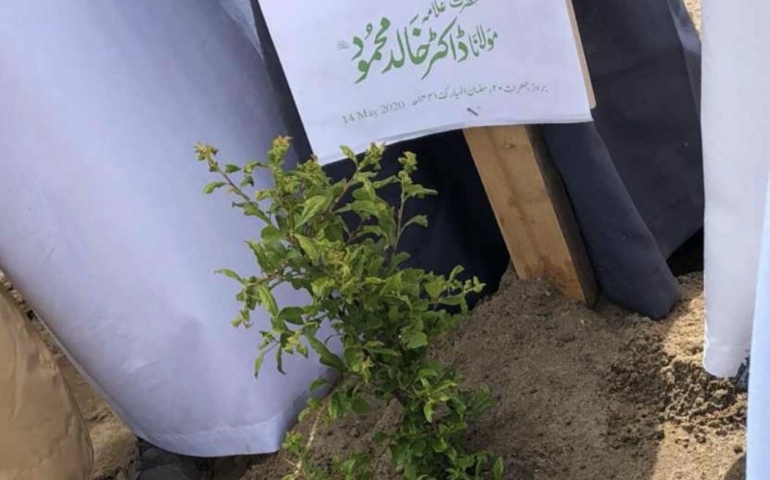
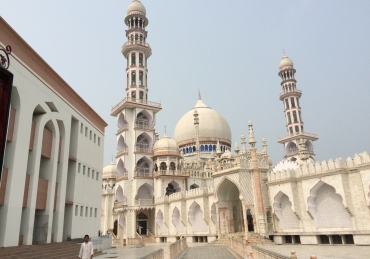
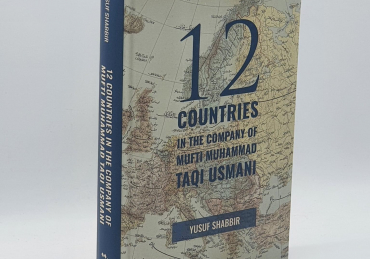

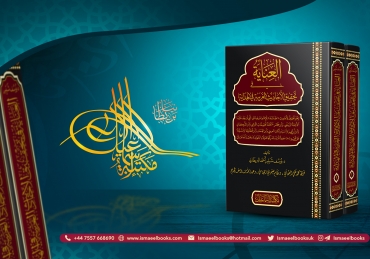
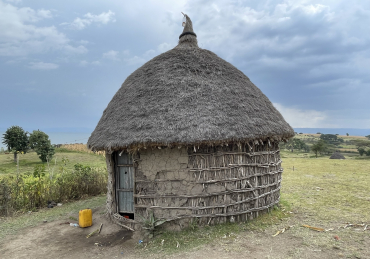
A glimpse into the book: Al-Iqd al-Thamin fi Hubb al-Nabi al-Amin Sallallahu alayhi wa Sallam